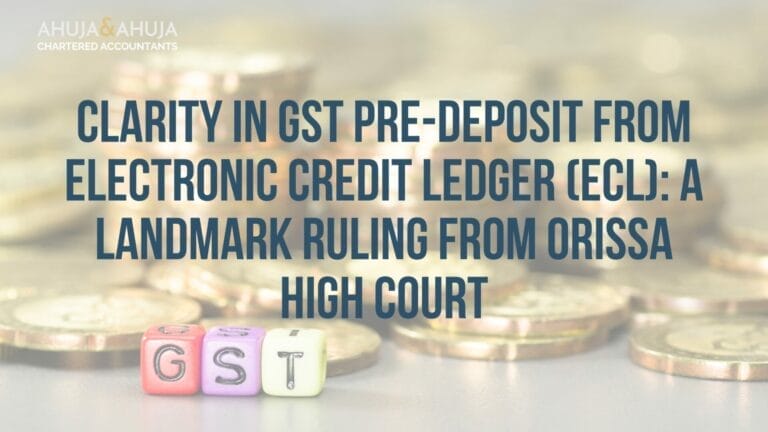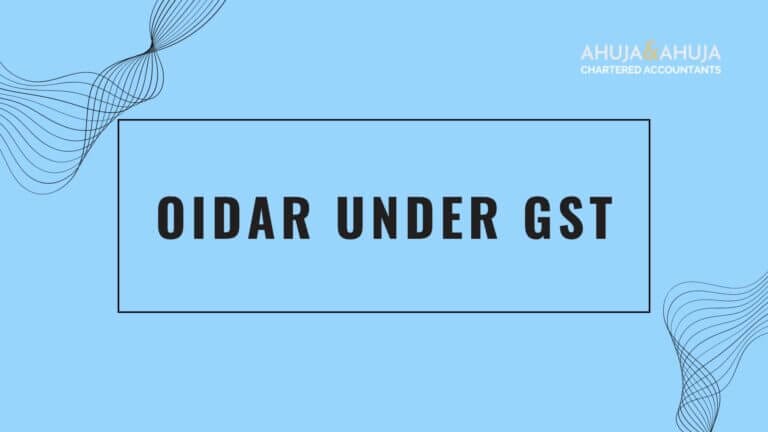Landmark Judgment on Applicability of GST on immovable property where no construction activity undertaken after Sale
For years, the real estate sector in India has wrestled with a persistent question: Does GST apply to the sale of an under-construction property if the buyer acquires it “as is,” with no further construction activity promised or performed after the sale? The confusion has been more than academic—crores of rupees have hung in the balance, with developers, buyers, and tax authorities often at odds over the correct tax treatment.
The recent judgment of the Karnataka High Court in M/s Rohan Corporation India Pvt. Ltd. v. Union of India (WP No. 12700 of 2023) has brought much-needed clarity to this issue. This article unpacks the judgment, explores its legal reasoning, and examines its far-reaching implications for the real estate sector and its stakeholders.
The Roots of Confusion: GST and Under-Construction Property Sales
At the heart of the debate lies a deceptively simple question: When does the sale of an under-construction property become a “supply” under GST law, and when is it simply a sale of immovable property—outside the GST net?
The confusion stems from the interplay of several factors:
- Industry Practices: Developers often sell properties at various stages of construction, sometimes with and sometimes without any further construction obligation post-sale.
- Diverse Interpretations: Tax authorities have tended to take a broad view, arguing that any sale of an “under-construction” property before a completion certificate is issued should attract GST, regardless of whether any construction service is actually rendered after the sale.
- Legal Ambiguity: The GST law itself, with its references to “supply of service” and “sale of building,” has left room for multiple interpretations.
This uncertainty has led to inconsistent practices, litigation, and, in many cases, GST being paid under protest—awaiting judicial guidance. For assistance on such disputes, GST litigation services can provide expert support.
The Legal Framework: Where GST Law Draws the Line
To understand the judgment, it’s essential to grasp the relevant provisions of the Central Goods and Services Tax (CGST) Act:
- Section 7(1): Defines “supply” as including all forms of supply of goods or services for a consideration in the course or furtherance of business.
- Section 7(1A): Clarifies that Schedule II helps classify whether a supply is of goods or services, but only if it is already a “supply” under Section 7(1).
- Section 7(2) & Schedule III: Lists activities that are neither supply of goods nor supply of services—these fall outside GST altogether.
The Key Schedules:
- Schedule II, Para 5(b): Treats the construction of a building intended for sale as a supply of service, but only if consideration is received before the completion certificate or first occupation.
- Schedule III, Para 5: Excludes the sale of land and (except as covered above) the sale of building from GST.
The Core Question:
Is the sale of an incomplete property, with no construction activity post-sale, a “supply of service” under GST, or is it simply a sale of immovable property—outside GST’s scope?
The Case Before the Karnataka High Court: Facts and Arguments
The Transaction:
M/s Rohan Corporation acquired an incomplete shopping mall from the liquidator of Lotus Shopping Centres Pvt. Ltd. through an e-auction as part of insolvency proceedings. The sale was on an “as is where is” basis—no further construction was promised or envisaged. The buyer paid stamp duty (a state levy) and, under protest, also paid GST as demanded by the liquidator and tax authorities.
The Dispute:
- The buyer (petitioner) argued that the transaction was a pure sale of immovable property, with no construction service provided post-sale, and thus not liable to GST.
- The tax authorities insisted that since the property was “under construction” and no completion certificate had been issued, GST was automatically applicable under Para 5(b) of Schedule II.
The Stakes:
A refund claim for over ?14 crore in GST paid under protest was at issue, hinging on whether the transaction was a taxable “supply” or a non-taxable sale of property.
The Court’s Approach: What Constitutes a Taxable “Supply”?
The Karnataka High Court zeroed in on a crucial test:
Is there a construction service performed by the seller for the buyer after the agreement?
If the answer is no—if the sale is simply of the property “as is,” with no further construction obligation—then the transaction falls outside the GST net, regardless of whether the property is “under construction” or whether a completion certificate has been issued.
This approach aligns with the Supreme Court’s reasoning in Larsen & Toubro and the Gujarat High Court’s decision in Munjaal Manishbhai Bhat, both of which emphasized that a “supply” under GST requires an agreement for construction service, not merely the sale of an incomplete property.
For those interested in the practical application of these principles, consulting GST consultancy services can ensure compliance and strategic tax planning.
Dissecting the Judgment: The Court’s Legal Reasoning
The Karnataka High Court’s analysis was both meticulous and pragmatic. Rather than getting entangled in the semantics of “under construction,” the Court focused on the substance of the transaction. Here’s how the reasoning unfolded:
1. The “Key Test”: Is There a Construction Service Post-Sale?
The Court established a clear threshold:
GST on under-construction property sales is triggered only if the seller undertakes construction activity for the buyer after entering into the agreement.
- No Construction, No GST: If the sale is on an “as is where is” basis, with no contractual obligation for further construction, the transaction is not a “supply of service” under GST.
- Schedule III Prevails: Such sales are covered by Schedule III, Para 5—meaning they are neither a supply of goods nor services, and thus, not taxable under GST.
2. Statutory Interpretation: Beyond the Completion Certificate
The tax authorities’ argument hinged on the absence of a completion certificate. The Court, however, clarified:
- Completion Certificate Not Decisive: The mere lack of a completion certificate does not, by itself, make a transaction taxable. What matters is whether there is a construction service agreement post-sale.
- Section 7 and Schedules II/III: The Court emphasized that Schedule II (which classifies construction as a service) only applies if there is a “supply” as defined in Section 7(1) of GST, If there’s no service, Schedule III’s exclusion applies.
3. Reliance on Precedents: Supreme Court and High Court Guidance
The judgment drew strength from earlier landmark cases:
- Larsen & Toubro (Supreme Court): Works contract taxability arises only when there is a contract with the buyer for construction. Construction done before such an agreement is not taxable as a service.
- Munjaal Manishbhai Bhat (Gujarat High Court): “Supply” under GST requires a service agreement; mere sale of property is not enough.
- VKC Footsteps (Supreme Court): Stamp duty and similar state levies are outside GST’s purview, reinforcing the distinction between state and central tax domains.
4. The “As Is Where Is” Clause: The Decisive Factor
The sale deed in this case was explicit: the property was sold “as is where is,” with no promise or obligation for further construction. This clause became the linchpin of the Court’s reasoning:
- No Service, No Supply: The absence of any post-sale construction obligation meant there was no “supply of service.”
- Industry Alignment: This approach mirrors real-world practices, especially in insolvency transactions or distressed asset sales, where buyers often acquire incomplete properties without expecting further work from the seller.
5. Application to the Facts: Refund Mandated
- No Taxable Event: The Court found that the transaction was a pure sale of immovable property, not a supply of construction service.
- Refund Ordered: The rejection of the GST refund claim was declared illegal. The authorities were directed to refund the entire GST amount paid under protest, with interest, consistent with GST refund services.
Key Takeaways for the Real Estate Sector
The judgment is more than a legal precedent—it’s a practical guide for the industry. Here’s what it means for various stakeholders:
For Developers and Builders
- Clarity in Sale Structuring: Developers must clearly distinguish between a sale of property and a contract for construction service. Sale deeds should avoid any language that could be interpreted as a post-sale construction obligation if GST is to be avoided.
- Drafting Precision: Agreements should be explicit about the “as is where is” nature of the sale when no further construction is intended.
For Property Buyers
- GST Safeguard: Buyers of incomplete properties can avoid unnecessary GST if the sale is truly “as is,” with no further construction services.
- Due Diligence: Buyers should ensure sale agreements and correspondence do not inadvertently create a construction service relationship.
For GST Professionals and Tax Advisors
- Documentation is Key: Maintain clear records showing the absence of post-sale construction obligations.
- Refund Strategy: Where GST has been paid under protest in similar scenarios, this judgment provides a strong basis for refund claims via GST refund services.
- Insolvency Transactions: Special attention is needed in distressed asset sales, where the “as is where is” clause is common.
For Insolvency Professionals and Liquidators
- Auction Clarity: E-auction and sale documents should be unambiguous about the absence of construction obligations.
- Bidder Communication: Clearly inform bidders about the GST position to avoid disputes and litigation.
Residual Risks and Grey Areas
- Defining “Construction Activity”: Disputes may still arise over what constitutes “construction activity” post-sale. Documentary evidence and clear contractual terms remain crucial.
- Audit Preparedness: Companies should anticipate scrutiny and maintain robust records to defend their GST position, working closely with GST audit services.
Broader Policy and Legal Implications
1. Alignment with GST Council’s Intent
The Karnataka High Court’s judgment resonates with the original policy rationale of the GST Council:
- Land and Building Sales Outside GST: The Council deliberately kept the sale of land and completed buildings outside the GST net to protect state revenues and avoid double taxation.
- Uniformity Needed: This judgment underscores the need for consistent application across states, reducing interpretational disputes and litigation.
2. GST vs. Stamp Duty—Navigating Dual Taxation
- Distinct Tax Domains: Stamp duty remains a state subject, while GST is a central levy. The Court reaffirmed that the sale of immovable property, when not involving a construction service, is subject only to stamp duty—not GST.
- Policy Opportunity: The judgment highlights the need for further harmonisation between central and state tax regimes, especially in complex real estate transactions.
3. Legislative and Judicial Developments on the Horizon
- Potential for CBIC Clarification: The Central Board of Indirect Taxes and Customs (CBIC) may issue circulars to ensure uniform implementation and reduce future disputes.
- Scope for Amendments: Lawmakers might consider refining statutory language to further clarify the GST treatment of such transactions.
- Litigation Watch: Other High Courts may be called upon to interpret similar facts, and divergent rulings could prompt Supreme Court intervention.
4. Impact on Industry Litigation and Future Transactions
- Guidance for Ongoing Disputes: This judgment provides a persuasive precedent for similar cases pending across India.
- Future Transaction Structuring: Developers, buyers, and insolvency professionals now have a clearer framework for structuring deals to avoid unintended GST exposure.
5. When Does GST Still Apply?
- Active Construction Post-Sale: If the seller undertakes any construction activity for the buyer after the agreement, GST will apply to the value of such services.
- Mixed/Partial Construction: In cases where only part of the construction is completed post-sale, GST may be apportioned accordingly—requiring careful documentation and valuation.
Practical Guidance & Action Steps
1. Documentation Checklist
- Sale Agreements: Clearly state the absence of any post-sale construction obligation.
- “As Is Where Is” Clauses: Ensure these are prominent and unambiguous.
- Supporting Evidence: Retain correspondence, certificates, and sale deeds that reinforce the nature of the transaction.
2. Structuring Transactions
- Avoid Ambiguity: Exclude any language that could be construed as a construction service agreement.
- Mitigate Litigation Risk: Engage legal and tax professionals early in the transaction process to review documentation. You may consult GST consultancy services for expert help.
3. Roadmap for Refunds
- Claim Submission: File refund applications promptly, referencing the Karnataka High Court judgment and enclosing all relevant documents. Utilize GST refund services for assistance.
- Follow-Up: Track timelines, respond to departmental queries, and escalate if delays occur.
4. Compliance & Audit Preparedness
- Record-Keeping: Maintain a comprehensive file for each transaction, including legal opinions and internal memos.
- Audit Response: Be ready to demonstrate, with evidence, that no construction service was rendered post-sale. Support from GST audit services can be valuable.
Conclusion
The Karnataka High Court’s decision in M/s Rohan Corporation India Pvt. Ltd. marks a watershed moment for the Indian real estate sector. By establishing that GST does not apply to the sale of immovable property where no construction service is rendered post-sale, the Court has provided long-awaited clarity and relief to developers, buyers, and professionals alike.
For the sector, the message is clear:
GST follows the service, not the status of construction.
If there’s no post-sale construction obligation, there’s no GST liability—regardless of whether the property is “under construction” or lacks a completion certificate.
Going forward, careful documentation, precise drafting, and proactive compliance will be the keys to navigating this new landscape. As jurisprudence evolves and policy adapts, stakeholders must stay vigilant, informed, and ready to act. For professional assistance, consider GST registration services and ongoing GST compliance.
Disclaimer
The materials provided herein are solely for educational and informational purposes. No attorney/professional-client relationship is created when you access or use the site or the materials. The information presented on this site does not constitute legal or professional advice and should not be relied upon for such purposes or used as a substitute for professional or legal advice.







